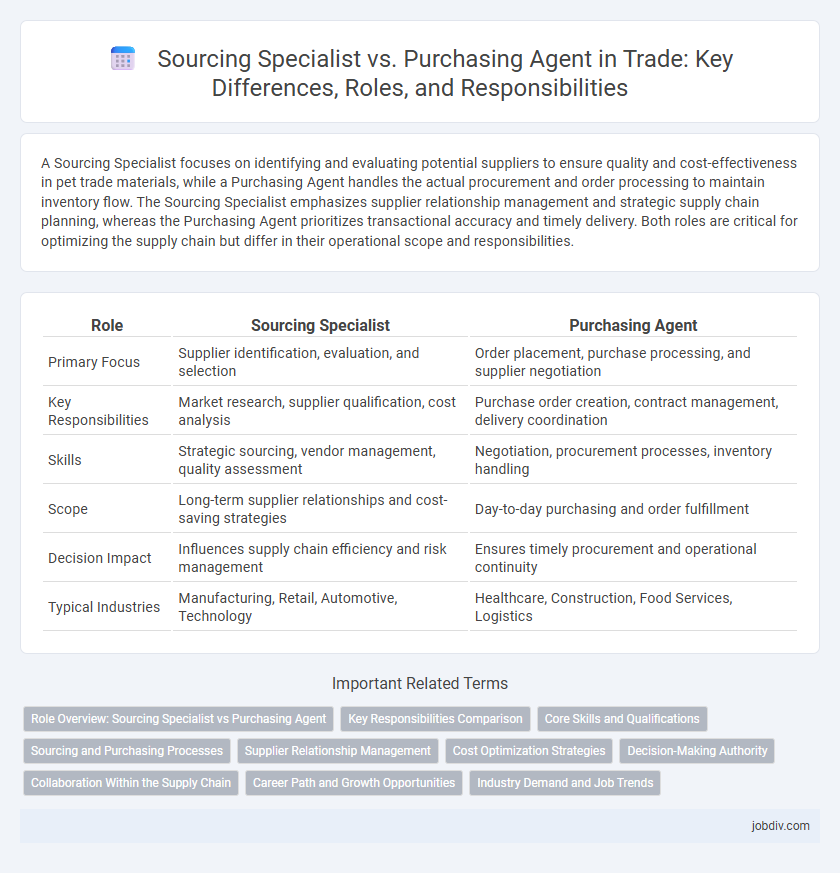A Sourcing Specialist focuses on identifying and evaluating potential suppliers to ensure quality and cost-effectiveness in pet trade materials, while a Purchasing Agent handles the actual procurement and order processing to maintain inventory flow. The Sourcing Specialist emphasizes supplier relationship management and strategic supply chain planning, whereas the Purchasing Agent prioritizes transactional accuracy and timely delivery. Both roles are critical for optimizing the supply chain but differ in their operational scope and responsibilities.
Table of Comparison
| Role | Sourcing Specialist | Purchasing Agent |
|---|---|---|
| Primary Focus | Supplier identification, evaluation, and selection | Order placement, purchase processing, and supplier negotiation |
| Key Responsibilities | Market research, supplier qualification, cost analysis | Purchase order creation, contract management, delivery coordination |
| Skills | Strategic sourcing, vendor management, quality assessment | Negotiation, procurement processes, inventory handling |
| Scope | Long-term supplier relationships and cost-saving strategies | Day-to-day purchasing and order fulfillment |
| Decision Impact | Influences supply chain efficiency and risk management | Ensures timely procurement and operational continuity |
| Typical Industries | Manufacturing, Retail, Automotive, Technology | Healthcare, Construction, Food Services, Logistics |
Role Overview: Sourcing Specialist vs Purchasing Agent
Sourcing Specialists focus on identifying and evaluating potential suppliers to secure the best quality materials at competitive prices, emphasizing strategic supplier relationship management and market analysis. Purchasing Agents primarily handle order placement, negotiation of purchase terms, and ensuring timely delivery to meet organizational procurement needs. Both roles are critical in the supply chain, but Sourcing Specialists drive long-term supplier strategies while Purchasing Agents manage day-to-day procurement transactions.
Key Responsibilities Comparison
Sourcing Specialists focus on identifying and qualifying suppliers, negotiating contracts, and developing long-term procurement strategies to optimize supply chain efficiency. Purchasing Agents handle order placement, vendor communications, and logistical coordination to ensure timely delivery of goods and services. Both roles require strong market analysis and cost management skills, but Sourcing Specialists are more strategic, while Purchasing Agents are more operational.
Core Skills and Qualifications
Sourcing Specialists excel in strategic analysis, supplier evaluation, and cost optimization with strong skills in market research, negotiation, and supply chain management, often requiring a background in business or supply chain degrees. Purchasing Agents focus on transactional procurement tasks, vendor management, and order processing, emphasizing attention to detail, contract knowledge, and inventory control, typically needing certifications like CPP or CPSM. Both roles demand proficiency in ERP software and strong communication skills, but Sourcing Specialists prioritize long-term supplier relationships while Purchasing Agents handle day-to-day purchasing operations.
Sourcing and Purchasing Processes
Sourcing specialists focus on identifying and evaluating suppliers to secure the best quality materials at competitive prices, ensuring long-term supplier relationships align with strategic business goals. Purchasing agents manage the transactional side of acquiring goods and services, handling order placement, contract negotiation, and supplier coordination to meet immediate operational needs. Both roles coordinate closely to optimize procurement efficiency, with sourcing driving supplier selection and purchasing overseeing order fulfillment and delivery.
Supplier Relationship Management
Sourcing specialists focus on strategic supplier relationship management by evaluating supplier capabilities, negotiating contracts, and ensuring long-term partnerships that align with organizational goals. Purchasing agents primarily handle transactional procurement activities, including order placement and purchase documentation, with less emphasis on deep supplier engagement. Effective supplier relationship management by sourcing specialists leads to improved supplier performance, innovation, and risk mitigation in the supply chain.
Cost Optimization Strategies
Sourcing Specialists leverage strategic supplier relationships and market analysis to identify cost-saving opportunities and enhance value in procurement processes. Purchasing Agents focus on executing purchase orders, negotiating terms to secure favorable prices, and managing vendor contracts for immediate cost efficiency. Both roles contribute to cost optimization by balancing long-term sourcing strategies with tactical purchasing decisions.
Decision-Making Authority
Sourcing Specialists hold greater decision-making authority by strategically selecting suppliers and negotiating contracts to optimize supply chain efficiency. Purchasing Agents primarily execute procurement decisions within established guidelines, focusing on order placement and supplier communication. The distinction in authority impacts the overall procurement process by balancing strategic vendor management with operational purchasing tasks.
Collaboration Within the Supply Chain
Sourcing Specialists and Purchasing Agents collaborate closely within the supply chain to optimize supplier selection and procurement processes. Sourcing Specialists focus on strategic supplier evaluation and contract negotiation to ensure cost-effective and quality materials, while Purchasing Agents handle order placement and supplier communication to maintain smooth operations. Their coordinated efforts enhance inventory management, reduce lead times, and improve overall supply chain efficiency.
Career Path and Growth Opportunities
Sourcing Specialists focus on identifying and evaluating suppliers, leveraging market analysis and negotiation skills to optimize cost and quality, offering clear progression into strategic procurement and supply chain management roles. Purchasing Agents handle order processing and supplier relationships, with career growth often leading to procurement management or vendor coordination positions. Both paths provide opportunities for advancement, but Sourcing Specialists typically advance into higher-level strategic roles due to their analytical and market-facing responsibilities.
Industry Demand and Job Trends
Industry demand for Sourcing Specialists has surged as companies prioritize strategic supplier relationships and global supply chain optimization, reflecting a shift towards cost efficiency and risk management. Purchasing Agents remain essential for transactional procurement tasks, but job trends indicate slower growth due to automation and standardized purchasing processes. The evolving trade landscape favors Sourcing Specialists who leverage analytics and negotiation skills to drive competitive advantage.
Sourcing Specialist vs Purchasing Agent Infographic

 jobdiv.com
jobdiv.com